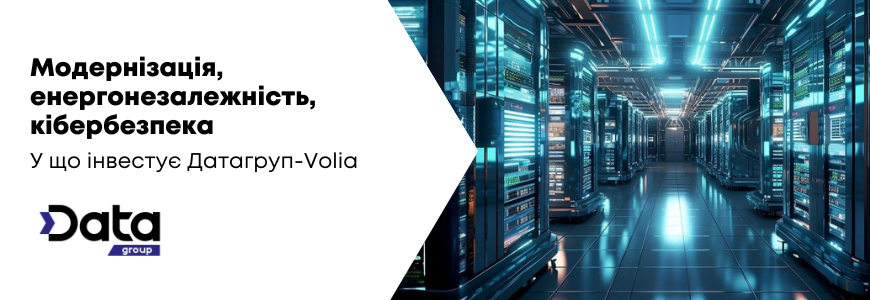
The challenges of wartime forced Ukrainian businesses to increase their investments. Datagroup and Volia were no exception. More details were provided in an article for Business Capital (dsnews.ua).
In addition to the need to restore the infrastructure destroyed by enemy shelling, the need to accelerate the modernization of the unified network, which began in 2021, came to the fore in order to secure its critically important elements, form backup routes, upgrade equipment, etc.
Therefore, during 2022-2023, Datagroup-Volia, together with Cisco and Juniper, actively carried out the modernization of the IP-Core and the backbone network, ensured the failure and energy resilience of the infrastructure, etc. Total investments in the implementation of plans in these areas accounted for the largest part of annual expenses, which increased from year to year: UAH 173.86 million in 2021, UAH 289.61 million in 2022, and UAH 354.5 million in 2023.
“In fact, in 2022 alone, we implemented what was planned for three years before the start of the full-scale invasion,” recalls Mykhailo Shelemba, CEO of Datagroup and Volia. “We had to reconsider our priorities and prioritize those that were most critical in wartime. We modernized IP-Core, the fault tolerance of the core network was more than doubled, and in key areas, the bandwidth increased 10 times. We created a large number of backup routes, paid attention to energy sustainability and cybersecurity.”
The complete modernization of the IP-Core network was carried out in record time — a little more than half a year versus two to three years according to the plan. This unique project for Ukraine allowed us to implement a fundamentally new network architecture. The most modern powerful equipment from Juniper was installed, as a result, the hardware capacity increased 20 times, and the bandwidth of router channels increased fourfold. The Ukrainian segment of the updated network was launched in 2023, and in 2024 the international segment was connected. It is important that the construction and expansion of the capabilities of the international segment is one of the priority areas of Datagroup-Volia's investments. Therefore, in terms of modernization and construction of the backbone network, the routes that allow connecting European sections with Ukrainian ones and with each other have significantly expanded.
The modernization of the Ukrainian part of the backbone network required the replacement of outdated equipment. As a result of the work carried out, 99% of traffic is already passing through modern Cisco equipment.
The OTT platform, which provides television services, has also undergone updates. In particular, a new architecture has been implemented for OTT and a new backup site has been built - from now on, the streaming traffic reservation has a terrestrial and cloud part. The company also launched functionality for creating its own video Internet channels, implemented a project to transfer OTT to a new data processing center (DPC), which allowed to increase the reliability of the platform, and made a number of other changes. In addition, new solutions have been implemented for connecting television via secure Internet channels - this is best suited for use by businesses, for example, hotels.
Datagroup-Volia has modernized and reserved the telephone network, implemented modern technologies for it, updated software and hardware, virtualized systems, and secured equipment in the new DPC.
In order to increase energy independence and network readiness for blackouts in 2022-2023. Datagroup-Volia invested over UAH 150 million. To do this, the company increased the number of generators and lithium-ion batteries that ensure the operation of the core and key nodes of the backbone network. Thanks to this, all the main nodes, and there are over one and a half thousand of them, can continue to operate in an autonomous mode during a power outage for at least 72 hours. The process of the company's increase in alternative power sources and necessary fuel reserves is still ongoing. In addition, in 2024, sections of the network that operate using GPON technology, which is considered more energy-independent, are being actively built. In Kyiv, Vinnytsia, and Lviv, DOCSIS technology is being replaced by GPON — more than 3,000 apartment buildings will be connected here by the end of the year. In Kharkiv, which is constantly suffering from Russian shelling, GPON is being implemented by modernizing the FTTB network. If it is possible to carry out construction work, it is planned to connect from 25 to 45 thousand subscribers here by the end of the year. The construction of GPON is another important priority in the Datagroup-Volia investment ecosystem. Over three years, it is planned to invest more than UAH 1.5 billion in this project.
In times of war, businesses also need to pay attention to protecting their networks from hostile cyberattacks. A number of important projects have been implemented by Datagroup-Volia in this direction, in order to secure IT infrastructure, systems and critical data from cybercriminals, as well as to have sufficient reserves for rapid response if necessary.
“Data protection and the ability to work even in the face of war challenges are a need of any Ukrainian business, not just our company,” says Mykhailo Shelemba. “So we also took care to provide certain opportunities for our clients — we built the Eurocloud cloud service outside of Ukraine. It is based in Germany, in Frankfurt am Main, in a modern data center with the highest level of international certification — TIER IV.”
Constant investments in construction and modernization, the introduction of new technologies and modern solutions allow Datagroup-Volia to create one of the largest, most flexible and secure networks in the Ukrainian telecom market. And further attraction of new investments related to the scaling of the company will take this process to a new level of development.
